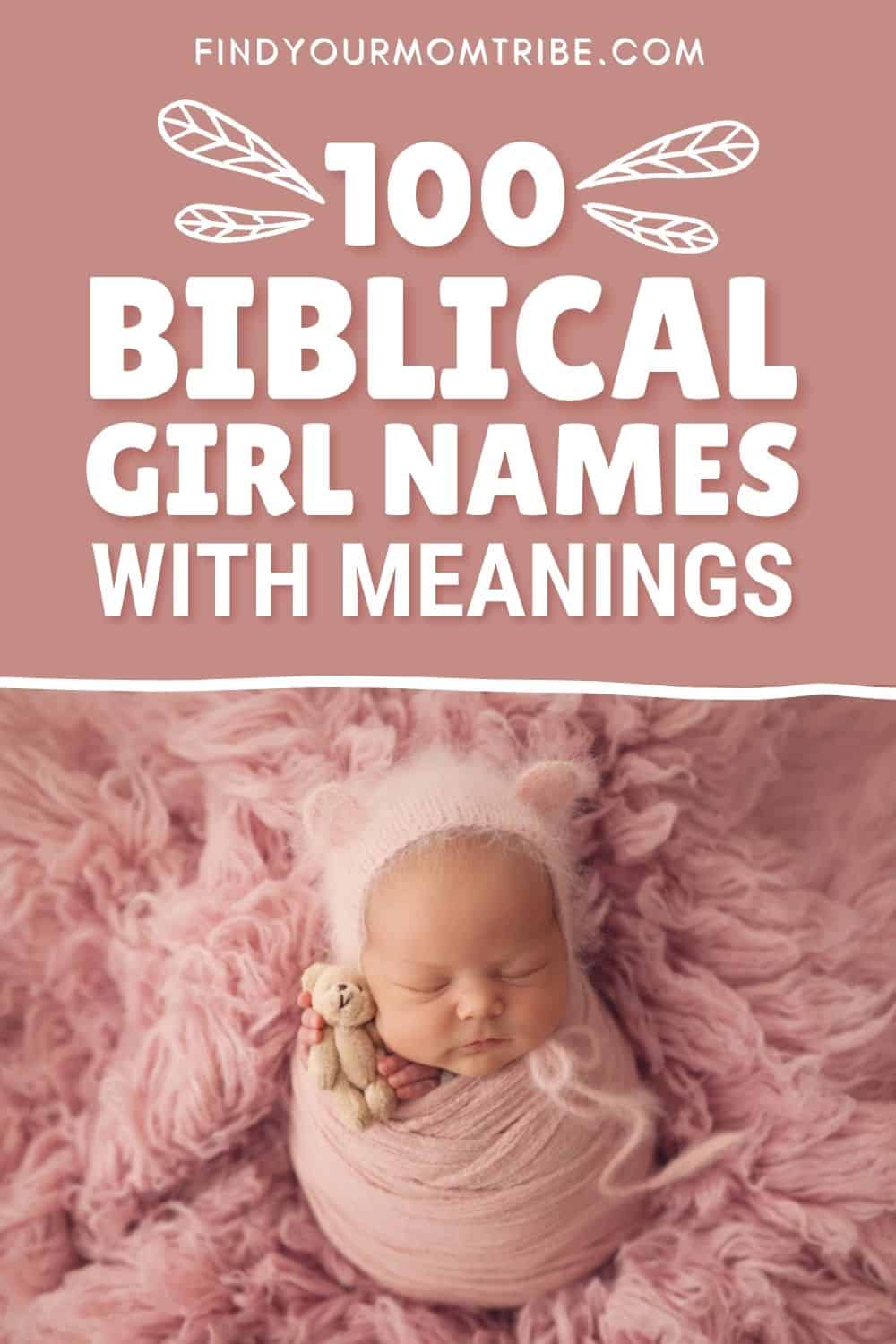Now, inspirations for baby names can come from nearly anywhere – from books, TV shows, or just honoring an old relative – but one of the most popular sources are biblical girl names.
Biblical girl names, while not as frequent as biblical boy names, are beautiful and special in their own right, hailing from various angels and saints scattered throughout the Holy Bible.
Whether it’s the Old Testament or the New Testament, or even the Hebrew Bible and some others, these coveted and sacred religious texts hold some of the most unique and inspiring names if you’re ever having trouble figuring one out for your child.
A lot of them may seem rather commonplace, but that’s because many other American moms use the names contained in the Good Book as inspiration, with Mary probably being one of the most popular baby girl names out there.
Some of the names you find in this little list of mine may end up surprising you as names like Sarah, Hannah, Elizabeth, and similar all stem from some part of religious culture. And I’m here to help show you the meanings behind them all.
If anything, it’ll help you pick one that you believe best suits your future child.
With all that said, let’s take a look at biblical girl names and meanings.
The 100 Most Popular Biblical Girl Names
1. Abana
A name of Hebrew descent representing something made of stone.
In 2 Kings 5:12, it’s the name of the chief river of Damascus, one that revitalized the barren desert land and brought fertility upon it.
2. Abigail

Abigail is a name that is similarly of Hebrew origin much like Mary is, but it’s one with a wholly different meaning to it.
Your husbands might like this one because the meaning of the name Abigail is a father’s joy – you may just end up with a daughter who prefers her dad more (sorry!) though that is actually quite common.
The name belonged to one of the only recorded female prophets of the Old Testament. A woman of great beauty, renown, and wealth who propagated peace and had managed to save the lives of her husband Nabal and King David himself.
While not as popular as Mary was in the 20th century, the name Abigail showed a rather sizable increase in popularity near the end of the 20th century, namely the ‘70s and onward before peaking in the early 2000s.
It still remains strong to this day as one of the top 10 biblical girl names overall.
SEE ALSO: Popular Nicknames For Abigail That Are Cute And Fun
3. Abital
Abital is a name with deep roots in Hebrew culture, carrying the meaning of an odd phrase, my father is dew.
It’s a unisex name, one that appears in the Bible adorning one of King David’s wives, the one who gave birth to his fifth son.
While not as popular globally, it’s one of the top names in Israel.
4. Abra
Another one of the biblical girl names with origins stemming from Hebrew culture and a derivation of Abraham, which means father of multitudes.
In the Holy Bible, Abra was one of King Solomon’s favorites.
5. Adah
Also known as Ada, this name is of both Hebrew and Germanic origins, meaning to be adorned, to be happy, or to be noble.
It has two mentions in the Holy Bible, both times in Genesis albeit as a background character. It’s better known for the first female computer programmer, Ada Lovelace.
It was a popular name in the 19th century, but fell off the map until recent years where it’s now among the top 300.
6. Adina
A unisex name with a deep Hebrew origin, holding the descriptive meaning of slender or delicate.
It was a name born by one of the Old Testament soldiers in David’s army, with not too much biblical significance, but still a beautiful name nonetheless.
Its popularity wasn’t exactly the greatest though, as it has been missing from the top 1,000 baby girl name charts for a while with only recently placing around the 950th spot.
7. Aquila
While more often used as a boy’s name in ancient times, the name Aquila can just as easily be unisex.
It is a name of Latin origin holding the meaning of eagle.
The name Aquila appears in Acts, Romans, and Corinthians as the name of a native of Pontus, belonging to a tent-maker who was one of Paul’s good friends and helpful assistants.
8. Ariel

A strong name with deep roots in Hebrew culture, its meaning representing the lion of God.
It can be either a baby boy name or a baby girl name.
Its biblical origins refer to either the messenger of Ezra or as the very symbolic name of the city of Jerusalem.
While its popularity was alright for most of the last century, its true peak was achieved not because of any biblical significance, but rather due to the release of The Little Mermaid back in the late 80’s, reaching a top 70 spot as a result.
Though after that, it’s slowly been dwindling and is now at a steady #172 on US lists of baby girl names.
9. Artemis
A name of Greek origin, one that represents the gift of Artemis, the goddess of the Hunt.
As for its biblical connotations, the spelling was slightly different, that of Artemas, a woman who was a companion of Paul, mentioned in Titus 3:12.
10. Astin
The Greek variation of the name Vashti, one that harbored popularity in baby girl names but faring somewhat better in the baby boy name categories given its unisex nature.
The Bible reference remains the same, belonging to Queen Vashti who was also known as Astin in the Grecian realms.
11. Atara
Atara (also Atarah), a name with roots in Hebrew culture, one that carries the meaning of crown.
The sole mention of Atara lies in 1 Chronicles 2:26 where Atarah was a woman who was the mother of Onam and wife of Jerahmeel.
12. Athaliah
Another one of the biblical girl names of Hebrew origin, one carrying the meaning of an afflicted of the Lord.
It’s a name that appears in the Bible three times as three different people, once as a woman and twice as men due to its unisex nature.
The female mention is of a woman who was the daughter of Ahab and Jezebel, one who ended up marrying Jehoram who was the king of Judah at the time with whom she had a son, Ahaziah.
After both her parents passed, she ended up the ruler of the kingdom for 6 long years after killing the rest of the royal family of Judah.
13. Azubah
A name of Hebrew origin meaning one who is forsaken.
In biblical terms, it’s a name mentioned in both 1 and 2 Chronicles and Kings – a name belonging to two women.
The first was the wife of Caleb, while the second belonged to the daughter of Shilhi who ended up marrying king Asa of Judah with whom she had a son Jehoshaphat.
14. Bathsheba
A Hebrew name, one that means either the seventh daughter or daughter of an oath.
In the Scripture, the name is mentioned in 2 Samuel, 1 Kings, Psalm 51:1 and in Matthew 1:6. Bathsheba was the wife of Uriah and daughter of Eliam.
After her first husband’s passing, she ended up remarrying to David.
She also ended up giving birth to 4 sons: Solomon, Nathan, Shobab, and Shimea.
15. Berenice
Berenice, also known as Bernice in more modern times, is a name of Greek origin meaning the bringer of victory.
A name mentioned in Acts that belonged to the daughter of the ruler of Palestine, Herod Agrippa.
16. Beulah
A Hebrew name depicting someone who is married.
Appearing in Isaiah as a name for the land of Judah that depicted it as a land favored by God.
17. Bilhah
A name of Hebrew descent that represents someone who is timid or bashful.
It’s mentioned twice in the Bible, once as the name of a city belonging to a Simeoni tribe and the other time the handmaid of Rachel and as one of Jacob’s personal concubines as well as the mother of Naphtali and Dan.
18. Calah
Another of these biblical girl names of Hebrew origin, one that represents maturity and completion.
In the Good Book, Genesis specifically, it’s the name of one of the oldest Assyrian cities that was built by Nimrod.
19. Candace

Breaking through the slough of Hebrew names, Candace is one with origins in Ethiopian and Latin cultures.
Its meaning represents someone who is pure or, like the name Sarah, a queen.
To that merit, its biblical mention appears as the queen of the Ethiopian people in the book of Acts where the apostle Phillip arrives and ends up converting her chief treasurer.
The name has been rather popular over the years, always remaining in the top 1,000 lists for the last century or two, with the peak of its wave being reached in the mid 80s where it almost broke the top 100 threshold.
20. Carmel
Unsurprisingly, Carmel is a name of Hebrew origin, one that depicts a park or an overall fruitful and bountiful place.
It’s used to name two places in the Holy Bible, the first one being in Judah, the native place of Nabal
The second mention is of a mountain in Central Palestine that belonged to the Asheri tribe where the prophet Elijah instilled the devotion to God back to his followers.
21. Chloe
Speaking of hidden gems, the name Chloe is a diamond in the rough. A beautiful name that barely managed to remain in the top 500 in the 20th century before falling off the radar before the 50s even hit.
It resurfaced at the start of the 21st century though, similarly to the way that Hannah did, and reaching all the way up to the top 10 where it peaked and has slowly dropped somewhere down to among the top 50 biblical girl names.
And its meaning is a perfect fit to its new rise to popularity, as it stands for new growth – a meaning that can be interpreted in many ways.
One can say that a child is a form of new growth as well – new life – and thus is very fitting for a beloved daughter to carry.
The meaning comes from Greek culture and their scripts, dating back to 1 Corinthians.
It is a name belonging to one of the earliest Grecian Christian women and was rather popular back in the day, remaining as such to this day and age on their shores.
22. Claudia
A name of Latin descent, one that holds the meaning of someone lame or limping.
Its one mention is in Timothy, belonging to a Roman Christian woman who was the daughter of King Cogidubnus of early Roman Britain and the wife of Pudens, a simple Roman knight.
23. Damaris
Now here’s a name that’s definitely an uncommon sight in modern times, despite having such a beautiful meaning behind it.
Holding to a Greek origin, Damaris means gentle or tame, sometimes referencing a calf.
In some way, it references the innocence of a child, her gentle nature and the pure way she views the world, willing to give anything a chance, and spreading her unbounding love and joy everywhere she goes.
Despite such beauty though, the name’s peak of popularity was in the early 2000s where it only reached a top 600 spot before falling back down into obscurity again.
That’s mostly due to its biblical significance being rather minor, belonging to a Christian convert in Athens mentioned in the Acts of the Apostles.
24. Daniela
A Hebrew name that is more of a statement: God is my judge.
While the name itself is female, its biblical origin of Daniel belongs to males – three of them in fact.
The first was the second son of David.
Then there was a great Biblical prophet who knew how to interpret dreams and whose exploits are fully recorded in the book of Daniel.
The third was a bit less prominent than the second, but important nonetheless, as he was the priest who returned from captivity in Babylon alongside Ezra who then followed up by sealing the covenant with Nehemiah.
25. Deborah
Another name carrying Hebrew origins, one that carries a rather peculiar meaning, referring to a bee.
As far as Deborah’s biblical ties are concerned, she has a whopping two. The first one is in the Book of Judges where Deborah is a prophetess of great renown and boldness, a leader who goes on to fight the Canaanites after forming her own army.
The second mention is in the book of Genesis, where Deborah has a less significant role, being the nurse of Rebecca.
In the very middle of the 20th century, it was quite the popular name, taking 2nd spot on all of the biblical girl name charts, but has fallen from grace ever since, now barely holding on to the top 800.
26. Delilah
Once again, back to the Hebrew origins as they seem to produce some of the most quality names on this little list. Delilah means delicate.
A meaning that can easily be transferred to your precious bundle of joy given how delicate she is in her first days of life, much like a budding flower.
It is a name stemming from the Book of Judges and the story of the invincible Samson.
It is a Hebrew name belonging to the villain in said book, one who deceives Samson into telling her the source of his power: his hair. Information which she uses to promptly de-power him and hand him over to the Philistines to face his fate.
Despite this rather unfortunate connection, the name itself is still rather beautiful and I’d rather stick to its Hebrew meaning than judge a child based on the actions of a woman who existed in another time.
Though, because of this tie, the name wasn’t too popular in the 20th century, but, much like many names you’ll see on this list, has resurfaced in the last 10-15 years and has taken a top 100 spot on the list of most popular girl names.
27. Diana

A name of Latin origin this time, one that describes something or someone divine.
It’s a name that holds most prominence as the Roman goddess of the moon, but its biblical reference comes from Acts 19:23-41 where it has a minor role.
28. Dinah
Of Hebrew origin, Dinah simply refers to someone who’s being judged.
While potentially an unpleasant connotation, the biblical meaning behind dates back to the Old Testament where Dinah was the daughter of Leah and Jacob.
There sadly isn’t much mention of Dinah in any other biblical scripts though.
It wasn’t the most popular of names, peaking only at the top 500 at the end of the 60s and falling from the top 1,000 lists shortly after, but it might see a resurgence like some of the other obscure biblical girl names on this list.
29. Drusilla
Another Latin name, one that means watered by the dew.
It’s a name mentioned in Acts, belonging to the wife of Felix, the governor of Judea, and daughter of Herod Agrippa, ruler of Palestine.
30. Eden
A beautiful name with its roots in ancient Hebrew origins, Eden simply means paradise, but most of you already knew that.
It’s a rather familiar name in the Bible, not referring to a person, but rather a place – the paradise God built for Adam and Eve.
It was ever popular throughout the years, lingering in the top 100-200 lists for nearly two centuries strong. It currently sits at #51 worldwide and #145 on the US baby girl name lists.
31. Edna
Meaning pleasure, Edna is yet another of these biblical girl names of Hebrew origin.
Its biblical tie is in the Catholic and Orthodox Bibles’ Book of Tobit where Edna is the mother of Sarah and wife of Raguel.
32. Elisha
A unisex Hebrew name meaning God is my salvation.
As far as its biblical connections are concerned, it’s a name that belonged to the son of Shaphat and the successor of the prophet Elijah.
He had gone on to perform many miracles afterwards.
33. Elizabeth

With Hebrew origins, Elizabeth is one for the more pious of you reading this, as it stands for God is my oath or pledged to God.
Certainly an ideal to aspire to, but even disregarding that, the name itself is beautiful and has belonged to many powerful women, namely two English queens, one of whom is still going strong and regarded as one of the most powerful women alive.
Another rather prominent woman who carried the same name was Elizabeth Blackwell, famous for being the first woman to ever receive a medical degree in the USA.
This was a rather momentous feat in female history given the less than favorable circumstances back then.
As for its biblical context, much like the name Anna, Elizabeth appears in the Gospel of Luke, albeit in a minor role that is hardly worth a mention.
But, despite that, the name has been popular all throughout the 20th century, even reaching the 6th spot in the 1900s and lingering in the top 20 little girl names in recent history.
It can undoubtedly thank the royal family for that one.
SEE ALSO: Interesting Nicknames For Elizabeth That You’ll Love
34. Ephrath
A name of Hebrew descent carrying the meaning of being fruitful.
The female Biblical tie is to that of Caleb’s second wife and the mother of Hezron.
35. Esther
Now here’s a name of an uncommon origin. This time it’s a Persian one.
While it may seem different, the name belonged to a Persian queen, queen Esther of Persia, who was a prominent leader according to ancient texts, one who had prevented the slaughter of the Jewish people in her own kingdom.
This feat is still honored annually through the feast of Purim and the woman herself has a whole book of the Bible devoted to her in honor of her great deeds.
And the actual meaning of the name itself is just as wonderful as queen Esther was: star.
A meaning that, much like that of Sarah, many parents like to give to their kids as nicknames, though in this case can be given as an actual name without fear of it being ridiculed, given its subtle beauty.
The name Esther was rather popular in the 20th century, remaining in the top 50 until the very end where it began a slow and steady decline in popularity, lingering in the top 200 in the past few years.
If you’re someone who likes picking unique names that were forgotten but remain hidden gems, then this might be just the right one for you to give to your child.
36. Eunice
Eunice is a name hailing from Greek roots, holding the meaning of a good victory.
Her biblical relevance comes from the pages of the New Testament where she was the mother of young Timothy, who later became Paul’s protege.
It was a name that was popular in the latter half of the 19th century, peaking at the top 100s in the early 20th century.
But it ended up suffering a tremendous drop in popularity afterwards, somewhere around the early 50s, to the point where it has completely disappeared from any and all top 1,000 baby girl name charts.
37. Eve
A very familiar name that is also of Hebrew origin, one that means either life or life giver.
Its biblical ties are probably one of the most well known as she was one of the first humans to have been created by the Lord made out of Adam’s rib and the woman who committed the first sin of man.
She was also the mother of three sons: Cain, Abel and Seth.
38. Ezra
Another unisex name and of Hebrew origin to nobody’s surprise, one whose meaning signifies help.
The name carries great significance in the biblical sense, belonging to that of the scribe Ezra in the book of the same name.
He was a key figure in helping enforce the teachings of the Torah in Jerusalem and one who led a group of Jews home from Babylonian exile.
Popularity-wise, the name Ezra carries more on the boys’ side of things, where it started becoming a lot more popular in 2010 onward thanks to a prominent character from Star Wars bearing the same name.
As for the girls, it’s a bit more uncommon, but still unique and used, albeit not on any of the top 1,000 baby girl name lists.
39. Faith
A name that is more of a modern biblical girl name than anything else, one that carries the meaning of one’s acceptance of God’s will and belief in God.
It doesn’t really represent a person or a place in the Bible. It’s more tied to the idea of faith and the importance thereof.
40. Gabriella

Gabriella is one of the more popular biblical girl names with roots in Hebrew culture, meaning champion of God.
It’s derived from the name of Archangel Gabriel, one of the Lord’s most trusted messengers, noted down in both Daniel and Luke.
41. Galilee
A Hebrew name representing a circuit or revolution.
In biblical terms, it’s tied to the Old Testament, used as the name of a country in Naphtali, whereas in the New Testament it was one of Palestine’s largest provinces.
42. Hadassah
A name ofIsraeli origin, Hadassah means myrtle tree.
It’s the Hebrew version of the name of aforementioned Queen Esther – the Persian queen who prevented the slaughter of the Jewish people and honored through the annual celebration of Purim.
It’s more often shortened to Haddie due to complaints about the name being overly religious otherwise and seen as a form of sin to use in its original form.
As far as its popularity goes, it hasn’t been too popular outside of Israel itself, always hanging around near the top 1,000, but never quite making it in, outside of a brief period back in 2007.
43. Hagar
Another uncommon name with Hebrew origins, one that signifies flight or, according to the Midrash, stems from “Ha-Agar,” which translates to this is the reward.
Its biblical ties come from the servant of Sarah who carried the same name, one who was later given to Abraham to help him continue his line and have a child to call his own.
That son would later be known as Ishmael, a revered figure in Islam and one of the prophet Muhammad’s great ancestors.
Given its rather unusual form, the name wasn’t really popular in the last 120+ years, not really appearing on any of the prominent baby girl name lists, but it’s still worth some consideration.
44. Hannah
Also appearing as Anna for short, Hannah is a name that has its roots in Israel and carries a strong meaning, that of wondrous grace and great favor.
It also just so happens to be the name of one of my friends’ daughters who encompasses both of those virtues perfectly and is an angel in her own right.
As for actual biblical ties, it’s one that belonged to Anna, the wife of Elkanah, back in the Old Testament.
She was yet another of the rare female prophets in the New Testament, one who played a significant role in it as, in the Gospel of Luke, she was the one who preached to the Temple about the role that Jesus will play in Jerusalem’s grand redemption.
Hannah as a name held the peak of its popularity all the way back in the 19th century before almost disappearing off the charts for the entirety of the 20th century.
That is, until it finally resurfaced near the end of it and came in strong, almost taking the top spot in the final years of the 90s and now holds a steady position in the top 50 biblical girl names.
45. Helah
A Hebrew name carrying the meaning of rust.
In the Bible, Helah was one of Ashur’s wives and the daughter-in-law of Pharez of Judah.
46. Hepzibah
Another name of Hebrew origin, one that means my delight is in her.
In the Holy Bible, she was the mother of Manasseh and the wife of King Hezekiah of Judah.
47. Herodias
A Grecian name, one that represents someone who is heroic.
In biblical terms, Herodias was a Jewish princess, daughter of Aristobulus and Berenice, and wife of Herod II before leaving him for his half-brother, Herod Antipas.
She was also the one who ordered John the Baptist to be decapitated for condemning her act of adultery.
48. Hodiah

A Hebrew name that showcases the majesty of God.
The name is referenced in 1 Chronicles, belonging to the sister of Naham who was also one of the wives of Ezra of Judah.
49. Hope
A name with roots in the English language this time around, one that portrays a confident expectation.
Similar to Faith, it’s not exactly describing a character in the Bible itself, but rather one of the core tenets of character that Christianity preaches.
50. Hosanna
A Greek name, one that means to save or I pray.
It’s not exactly a name of a person in the Bible, but rather a phrase, as you can see by its meaning – one that was exclaimed in cheers when Jesus healed the lame and the blind in the temple of Jerusalem as part of their chant of reverence.
51. Jael
A name dating from ancient Israel whose meaning doesn’t do it justice, referring to that of the humble mountain goat.
But, in the biblical sense, the name Jael holds much bigger significance than a simple goat. It’s the name of the wife of Heber the Kenite.
This is the woman who used a tent peg of all things to murder the Canaanite general who retreated after Deborah defeated his army, and sent him running with his tail between his legs.
52. Jemimah
The name Jemimah, also known as Gemma, is another in the long list of biblical girl names with origins coming from ancient Hebrew culture, carrying the meaning of a beautiful dove.
In biblical terms, Jemimah was one of Job’s three daughters, with not much of a grand role otherwise.
Despite that, its modern variation, Gemma, has been growing in popularity since the late 40s and has almost reached a top 200 spot on many a baby girl name list in recent years. It’s a nice alternative to the name Emma.
The reason the full name isn’t used, at least in the US, is because it carries a slightly negative and potentially racist connotation to it.
53. Jerusha
A Hebrew name meaning someone who is either married or possessed.
The name appears in both Kings and Chronicles as the wife of King Uziah with whom she had a son who would later be known as King Jotham of Judah.
She is also the daughter of Zadok.
54. Jescha
A Hebrew name that simply means to behold.
It is a variation of the name Iscah, one that, in biblical terms, belonged to the niece of Abraham.
55. Joanna

A name best known thanks to St. Joan of Arc, but what people don’t know is that it’s actually a name of Hebrew origin, meaning God is gracious.
And prior to Joan of Arc, it had actual biblical ties all the way back in the Gospel of Luke.
It belonged to one of the women who went with Mary Magdalene to Jesus’ tomb to anoint his body, only to discover that it was missing and the tomb was empty.
It’s a rather popular name too – even in recent times it orbited around #200, although it was popular enough to be in the top 100 back in the 80s.
56. Jordan
A unisex Israeli name with the meaning of descender or something that’s flowing down.
It’s the name of one of the countries in the Middle East, as well as a river and the river’s existing biblical ties.
Jordan is referenced many times in the Bible. It was the preferred place for baptisms performed by John the Baptist, where Joshua famously led the Israelites across its dry riverbed, and even Jesus’ many pilgrimages were performed along the famed river.
57. Judith
Now Judith is one of the most prominent Israeli heroines, the main character in the titular Book of Judith spoken about in the Old Testaments of both the Eastern Orthodox and Catholic churches.
It tells of Judith, a widow who saves the nation of Israel by infiltrating the camp of Holofernes, an Assyrian general set out to conquer Israel, murdering and decapitating him for her people.
While a bit graphic, the message the tale carries served as inspiration for many writers and women of recent times.
Sadly, the Protestant church didn’t deem it a necessity to include such a thrilling and iconic account.
The meaning behind the name is a bit less exciting than the story of Judith: a woman from Judea.
Meaning aside, it’s a name that carries a certain beauty with it as well as a note of inspiration.
It was in my top 10 list of baby girl names when my first child was born and is definitely up for consideration should I ever decide on expanding the family roster some more.
People seemed to agree with that sentiment back in the 40s where it peaked at #4, only to slowly but surely decline as time passed, reaching the depths of the top 1,000 baby names for girls.
58. Julia
One of the more popular biblical girl names of Latin origin and one tied to the calendar month of July, the name’s meaning is that of someone youthful or soft-haired.
She’s mentioned in the Romans 16:15 as one of the people saluted by Paul. She was one of the earliest Roman Christians and most likely the wife of Philologus.
59. Junia
A name whose origins are derived from Latin scriptures referencing someone belonging to Juno.
It also has close ties to the month of June in our current calendar.
As for its biblical significance, it was a name that belonged to a Christian prisoner who was serving a sentence in the same jail as Paul and Andronicus, and is the only female named Christian apostle in the New Testament.
60. Kandake
A Greek variation on the name Candace mentioned earlier, meaning someone who is pure and sincere.
It goes without saying that it also references the same character in the Holy Bible, that of the Ethiopian queen, Candace.
61. Keren
A name derived from the Hebrew word Kerenhappuch, meaning horn of cosmetics.
In the biblical sense, it’s the name of one of the three daughters of Job other than Jemima and Kezia, born after his trials and tribulations were over. Keren was dubbed one of the most beautiful women in the region.
62. Kezia
A name as sweet as the Hebrew meaning that it represents – that of cinnamon.
Her biblical significance is about as relevant as that of Jemimah, given how she was the 2nd of the three daughters of Job.
The name itself, despite its uniqueness or maybe due to it, is one that has never shown up on any officially recognized biblical baby girl name lists in the US.
63. Keturah

Keturah, a name with Hebrew origins, describes someone who is fragrant or perfumed.
In the Bible, she’s mentioned in both Genesis and Chronicles as the second wife of Abraham who came to him after Sarah had passed, and who gave birth to six of his sons: Ishbak, Shuah, Midian, Jokshan, Medan, and Zimran.
64. Leah
Despite being a rather consistently popular name throughout the past two centuries, floating between the top 20 and 30 names, but never falling further, Leah isn’t a name we commonly come upon despite being so lovely.
It may be due to its Hebrew origin, but that isn’t what makes people gravitate away from it, rather that the meaning behind it is weary.
Not really something someone would like to be known by, but it remains popular nonetheless.
The biblical significance of the name dates back to the first wife of Jacob who carried the same name, who gave birth to 6 sons, all of whom went on to form part of the leadership over the 12 Israeli tribes.
65. Lilith
A name of Assyrian origin, one with a rather spooky and bone-chilling meaning, referencing a ghost or a monster of the night.
Its biblical connection comes from Jewish folklore where Lilith was Adam’s original wife, one who was rejected by him because she wouldn’t obey him and became the mother of all demons.
A name that carries a bit of that stigma behind it and is seen in a negative light, but one that sounds quite beautiful when pronounced and is hovering around the top 400 spot on many US biblical girl names charts.
66. Lois
The meaning behind this Greek name may be a bit lofty, meaning superior or the best, but which mom doesn’t hold that sort of bias for their child?
In our eyes, our kids are the best we could ever ask for and so it makes sense that we’d want to give them a name that represents that, not so?
One of the most famous carriers of this name in recent times is Miss Lois Lane, a fictional comic book character who was praised as an icon and role model of young girls due to her confidence and sense of justice.
She embodies the meaning behind her name perfectly.
As for the biblical meaning, it’s one that comes from the New Testament in this case. The name Lois belonged to the grandmother of Timothy, the man who evangelized alongside Paul.
Despite all of these positive connotations attributed to the name, its popularity has steadily dropped since the early 50s to the point where it fell off the top 1,000 list altogether.
It was rather popular and in the top 100 best girl names in the first half of the 20th century though.
But again, don’t let simple metrics dissuade you. Feel free to christen your darling little daughter with whichever name you feel inspired by.
67. Lydia
A name that doesn’t have too much significance in the biblical sense as it doesn’t belong to a woman as prominent as Esther was, for instance, but it still holds some merit.
That’s because the name belonged to one of the first women converted to Christianity by Paul in the New Testament.
The name itself is of Greek origin, referencing a woman from the Asia minor region of Lydia.
Despite its humble meaning, the name has remained one of the most popular biblical girl names throughout the last 120 odd years, remaining firmly in the top 100 for quite a while and still going strong.
68. Martha
A name that oddly enough isn’t of Israeli roots like many of the names on this list, but rather Syrian, meaning lady.
And what a lady she was, at least in biblical references.
Martha, alongside her sister Mary of Bethany, hosted Jesus in her home, though she played a less prominent role in the Bible, only serving as a cook to provide nourishment to their guests while her sister was the one learning from Jesus Christ.
Thanks to that mention though, the name is often used in professions that provide assistance to others, especially in fiction.
Popularity-wise, it was quite the name in the 19th century, keeping a top 50 spot for the entirety of it and even the first half of the 20th century.
But, its glory days soon ended thereafter and it plummeted to top 800 over the course of 70 years.
69. Mary
Starting with one of the most famous female biblical names in the Christian Bible, Mary is actually a name of Hebrew origin with a meaning that may not be as celebrated as the person it belonged to.
It was one of the most popular names back in the first half of the 20th century and has kept going strong up until the end of the first decade of the 21st century where it fell just below the top 100 mark.
The name Mary stands for rebellion and bitterness, the former well attributed to a child who has a good head on her shoulders and loves to fight for her beliefs, ideal for headstrong and proud women.
I know I don’t really have to explain the origin of the name from the Good Book too much, but for those that don’t know, it stems from Mary Magdalene, the woman who gave birth to the Lord and Savior Jesus Christ himself.
It also belongs to the woman who was a gracious host to Jesus, Mary of Bethany, a less known yet still important figure from biblical times.
70. Mehitabel

Unsurprising to most, here’s yet another name with its roots deeply entrenched in ancient Israeli culture, Mehitabel, the meaning of which describes someone who’s favored by God.
In Scripture, Mehitabel was the wife of one of the kings of Edom, Hadad.
71. Mercy
Mercy, much like Hope and Faith, is a more modern biblical girl name with its origin stemming from the English language, meaning mercy or compassion.
A name that, rather than references a character from the Bible, represents some of the core positive tenets of what Christians are taught to practice.
72. Michal
A Hebrew name carrying the meaning of a babbling brook, Michal isn’t one that’s rather popular in the States, but seems to carry a lot of prominence in its country of origin, Israel.
In the pages of the Good Book, Michal was the name of Saul’s daughter, who was given to David as his new wife.
Michal is also the one responsible for saving David from being killed by her own father.
One can also argue that the name loosely connects to that of Archangel Michael.
73. Miriam
A name with a similar meaning to that of Mary and also hailing from Hebrew roots, carrying the meaning of bitterness or rebellion.
It is a name that has lingered around the top 300 spots for the last 120 years with a solid start near the top 200, but slowly seeing its popularity dwindle over time.
Biblically speaking, the name Miriam belongs to a prophetess as well as the name of Aaron and Moses’ sister.
74. Naamah
A name Hebrew origin that simply describes someone or something that’s beautiful.
The name Naamah is familiar to those who’ve read the Old Testament, as it belonged to one of the wives of Solomon, and the daughter of Zilla and Lamech.
75. Naomi
Naomi is an Israeli name, holding the meaning of pleasant.
Fun fact, Naomi is the same mother-in-law that was mentioned when describing the name Ruth.
And Ruth was actually the great grandmother of King David. After her sons and husband died though, she denounced her former name and changed to Mara, which holds the same meaning as Mary, meaning bitter.
While not as popular in the early 20th century, it’s a name that’s been picking up pace in the 21st century, currently sitting in the top 75 names.
76. Neriyah
A name of Latin origin, one that means light.
In the biblical sense, it’s a name that is mostly referenced to Nereus, a Christian in Rome who Paul had addressed and offered his salutations to.
Neriyah hasn’t quite made the top lists, but remains somewhat popular around Israel due to its unisex nature and beautiful meaning.
77. Noa
Noa is the more effeminate version of a name familiar to many of us in the form of Noah, rooted deeply within ancient Hebrew culture, representing movement.
Apart from the obvious connection to Noah from the story of Noah’s Ark, the actual name Noa belonged to one of the five daughters of Zelophehad.
One might call her the pioneer of the gender equality movement as she was the one who managed to fight for the right of her and her sisters inheriting her father’s belongings after his passing, breaking all sorts of customs for that time period.
And thanks to Moses, they were successful under the understanding that they’d find someone to marry within their own tribe for the deal to work.
As for the name’s popularity, it hasn’t been on the radar for the entirety of the 20th century, but it has slowly been rising through the ranks for the past 10 years, currently reaching a top 750 spot on many baby girl name lists.
78. Orpah
One of the biblical girl names whose alternative spelling is bound to be familiar to most of you as Oprah, the name carries roots from Hebrew culture and means the back of the neck of a fawn.
In the biblical sense, the name appears in the book of Ruth as a daughter-in-law to Naomi.
Popularity-wise, despite being attributed to Oprah Winfrey, the name itself has never broken the top 1,000 charts of baby girl names.
79. Persis
A name of Greek origin holding the meaning of Persian woman.
The name’s mention in Scripture appears in the New Testament, specifically in Romans 16.12, belonging to one of the earliest Roman followers of Jesus Christ.
Persis was a pious woman, commended even by St. Paul, and a beloved and devoted Christian in the Lord’s eyes.
80. Phoebe

Another Greek name (though one you may more closely attribute to Phoebe from the 90s TV show Friends) is a name that belonged to a deaconess of the holy Christian church mentioned by Paul in Romans.
The meaning of the name is shining, an attribute any mom would gladly give to her precious daughter to signify the shining beacon that her daughter has become and will always be in her life.
Despite the religious significance, the beautiful meaning behind the name, and its ties to one of the most popular sitcoms in history, the name Phoebe has been in the lower half of the top 500 baby girl names.
Of course, the numbers are purely arbitrary as it all really comes down to personal preference. So don’t let the ranking dissuade you from picking this name for your baby girl if you like it.
81. Priscilla
Our first name on this list is of Latin origin, belonging to a woman in the New Testament who was one of the leaders of the early Christian church.
Priscilla means ancient. While not the best descriptor for a child, it’s still a lovely-sounding name nonetheless – one that, if you like, you shouldn’t feel ashamed of giving to your future child.
This is also further reinforced by its popularity in the last century where it was in the top 150 in the late 40s, after which it slowly dropped to the top 600 in recent years.
82. Rachel
Rachel means ewe in ancient Hebrew scripts and is one of my personal favorites.
It’s quite the popular name too, always hanging around the top 200s in many different baby girl name lists and peaking in the 80s and the 90s of last century, reaching a top 20 spot – even going so far as ranking 6th near the end of the century.
Nowadays, it’s fallen out of favor and is near the #200 spot, barely holding on.
In biblical terms, the name Rachel appears in Genesis, who was Jacob’s favorite wife and mother to his kids, Joseph and Benjamin.
83. Rebecca
The name Rebecca is yet another name originating from the Hebrew, one holding the meaning to tie or to join.
As for her biblical reference, it comes from Genesis. She’s the wife of Isaac and mother of his twin sons, Jacob and Esau.
The name was always within the top 1,000 names from the 20th century, with an odd peak in the 70s where it reached the top 10 after which it had a slow decline leading it down to the top 300 in recent years.
84. Rhoda
A beautiful name of Greek origin, representing a blooming crimson rose.
Rhoda used to be a popular name in the early 20th century, always bouncing around in the top 250 on many lists before quickly falling out of flavor in the latter half of the same century.
In the New Testament of the Bible, the name belonged to a servant girl of the mother of John Mark, one who was frightened when Peter knocked on the door after being released from prison before his term was served.
85. Ruth
Ruth originates from Hebrew, meaning friend.
It belonged to the heroine of the book of Ruth, an ancestor of King David himself, depicting her as a loyal friend to her mother-in-law after Ruth’s husband passes away.
It’s one of the evergreen names, ranking among the top 5 in the early 20th century and dipping to 50 by the end of the first half with a steady decline thereafter, with its place now just missing the top 250 in recent years.
86. Salome
A name of Aramaic origin, one holding the meaning of peace.
One that had placed in the top 1,000 spots in the early 20th century, making it even to the top 700 spots back in the day.
As for its biblical connotations, the name Salome belonged to two people in the New Testament alone.
The first one was Salome, daughter of King Herod, who requested the execution of John the Baptist via decapitation.
The other one was a bit more tame, the mother of the apostle brothers, James and John and one of the three women who had found out that Jesus’ tomb was empty and he’d risen from the dead.
87. Sapphira
Another name of Greek origin, one that represents the blue gemstone Sapphire.
While the name itself is beautiful, it carries negative connotations in the biblical sense.
That’s because it belonged to a woman who decided to commit tax fraud and ended up being punished by God in the pages of the New Testament.
Because of that, its popularity isn’t as strong as some of the other names listed here, appearing on none of the most prominent top 1,000 biblical girl name lists.
88. Sarah

Now, those of you who know the story of Isaac and Abraham might recognize the name Sarah as the wife of Abraham.
In Genesis, God promised Sarah and Abraham that they’d be able to conceive a child of their own at some point in their lives, a fact that Sarah herself put off as a joke to the point of laughing about it.
She perceived it as a cruel joke, given how she was well past her prime and menopause had already hit without her being able to get pregnant.
But, as God works in mysterious ways, what he had ordained did come to pass, but only once Sarah was almost 90 years of age.
While the story itself is a rather bleak one, the meaning of the name Sarah is a lot more cheerful.
Of Hebrew roots, Sarah stands for princess, a name befitting a female child, one that will elevate her to the status that you perceive her in – at least in your eyes and the eyes of your family.
It’s a name that’s easily given to newborn girls because it doesn’t require a specific characteristic that may prove to be false later on in life.
Plus, it just rolls off the tongue, doesn’t it?
That said, if you’re looking to be unique, you may find yourself out of luck. Sarah has been in the top 50 names for at least the last 120 years, with a peak in the 90s where it became the third most popular baby girl name.
89. Sarai
Sarai is a name similar to that of Sarah, coming from the same Hebrew origin and also meaning princess.
It’s a variation on the name, albeit a less popular one, though still keeping a solid spot in the top 500 baby girl name lists.
It also carries similar biblical significance to that of Sarah, the wife of Abraham and the woman who laughed at God’s prediction of pregnancy when she’d already hit menopause.
The actual mention of Sarai was Sarah’s initial name, one that God had changed to Sarah.
90. Selah
Yet another name of Hebrew descent that carries an undecided meaning among biblical scholars, one that could potentially be a musical term that references pauses in song or perhaps to reflect.
The reasoning behind that is because its biblical mentions don’t come from actual Bible text, but at the ends of many verses in the book of Psalms.
Selah as a name was unknown for the duration of the 20th century, but is gradually rising up now, sitting around the top 500 spots in recent times.
91. Shifra
A name of Hebrew origin (to nobody’s surprise), one that holds the meaning of lovely.
In the Bible, it was the name of the midwife who helped deliver the future prophet Moses to this world.
92. Shiloh
A more uncommon Hebrew name, one that means peaceful in their ancient language, Shiloh is a more unisex name that, oddly enough, still ranks quite well.
It wasn’t around much in the 20th century, but it reared its head in 2007, breaking through the top 1,000 barrier and settling in at around the #560 mark.
Scripturally speaking, Shiloh was a place mentioned in the Bible and some people speculate that it may also have some ties to the Messiah himself.
93. Susanna
Back to some more common modern names, we have Susanna. It’s actually of Hebrew descent too, surprisingly enough, and one with a floral meaning – lily.
Susanna is mentioned in the book of Daniel as the woman rescued by the prophet Daniel from being blackmailed by two men who wanted her to commit indecent acts after being wrongfully accused of adultery.
Its highest success was in the late 50s and early 60s where it boasted second place on the biblical girl names lists, but dropping out of favor gradually until finally disappearing off many lists.
94. Tabitha
A name of Aramaic descent, one carrying the meaning of the gazelle and its grace.
Tabitha is mentioned in the Book of Acts as a woman, formerly known by her Greek name Dorcas, who brings Peter back from the dead.
As for its popularity, Tabitha was a popular name in a good portion of the 20th century, peaking in the late 70s at somewhere around the top 200 mark and receiving another surge when the series Bewitched hit the small screen.
It fell off rather quickly afterward, completely disappearing off of all the popular and best known baby girl name lists a few years ago.
95. Talitha
Now, if you’re looking for a unique name, but one that still carries some biblical significance, you may want to look toward Talitha.
It doesn’t hail from any of the popular origins like Greek or Hebrew, but rather one that’s quite rare, an Aramaic one.
It means little girl – a rather fitting name for your little girl that’s soon to arrive, is it not? And it’s a rather rare name too, never appearing in the top 1,000 baby girl names in the last 120 years.
Despite that, it’s still a beautiful name, one that, according to the New Testament, belonged to a little girl that Jesus raises from the dead, dubbing her with this titular name.
While she was no saint, being someone who was brought back to life by our Lord and Savior surely deserves a bit more recognition.
Who knows, maybe it’ll resurface in a few years.
96. Tamar

Tamar, better known as Tamara in more modern times, is also a name hailing from ancient Hebrew origins, one with a rather plain meaning: palm tree.
Despite that, it’s been a very popular name for the latter half of the 20th century, fluctuating erratically for quite a while and peaking in the mid 70s with a solid rank of #64.
The name’s origin in the biblical sense of the word comes from the Old Testament.
In the first book of the Bible, Tamar was Judah’s daughter-in-law and one of Jesus’ ancestors.
Quite the big significance, if I do say so myself, especially because she had to find a way to have a child after the death of her first husband to preserve the Judah line and enable Christianity to even be conceived.
97. Vashti
Vashti is a mysterious name of Hebrew origin with an equally mysterious meaning. Some speculate it might mean beautiful, but there isn’t any evidence to support the claim.
In Scripture, the name Vashti belongs to a queen of Persia, the predecessor of Queen Esther, and appears in the book of Esther who replaced her on the throne after marrying King Ahasuerus.
Another rather unusual and unsought after name, only briefly breaking the top 1,000 mark a few times.
98. Zillah
Another mysterious Hebrew name, though not for a lack of meaning this time but for the actual meaning itself: shadow or shade.
It’s a name that’s not often found anywhere, one that has never quite managed to break into the top 1,000 baby girl name lists.
Its first mention in the Bible is interesting though, as Zillah was the name of one of the wives in the first biblically recorded polygamous relationship.
99. Zilpah
Back to the obscure Hebrew names, Zilpah’s meaning is also a relative unknown, potentially carrying the meaning of frailty or to drip, sprinkle, or pour.
In the Bible, she was one of Jacob’s slaves and the mother of two of his sons, Asher and Gad. She is said to have been buried in Tiberias in the Tomb of the Matriarchs.
Just like its meaning, Zilpah’s popularity remains unknown since it has never appeared on any name rankings so far.
100. Zipporah
Another name of Hebrew origin, carrying the meaning of bird.
In the pages of Exodus, Zipporah was the daughter of Jethro and wife of the prophet Moses.
As far as name popularity goes, it hasn’t been included on any top 1,000 lists so far.
In Conclusion
Biblical girl names tend to be harder to choose from given their rather difficult pronunciations, unlike evergreen biblical baby boy names like Samuel, Noah, Aaron, and the like.
But, that doesn’t mean that there aren’t many special and uniquely beautiful ones in their own right.
Some of them do carry negative biblical ties or meanings, but there are many to choose from or use as inspiration. So find one that you really like and feel will fit your new daughter best.
READ NEXT: Best Biblical Boy Names With Meanings For Your Little Angel
Like this post? Please share or pin it for later. You can also stay in the loop and follow us on Facebook, Instagram or Pinterest.

This post contains affiliate links. Please see our full disclosure for more info.

